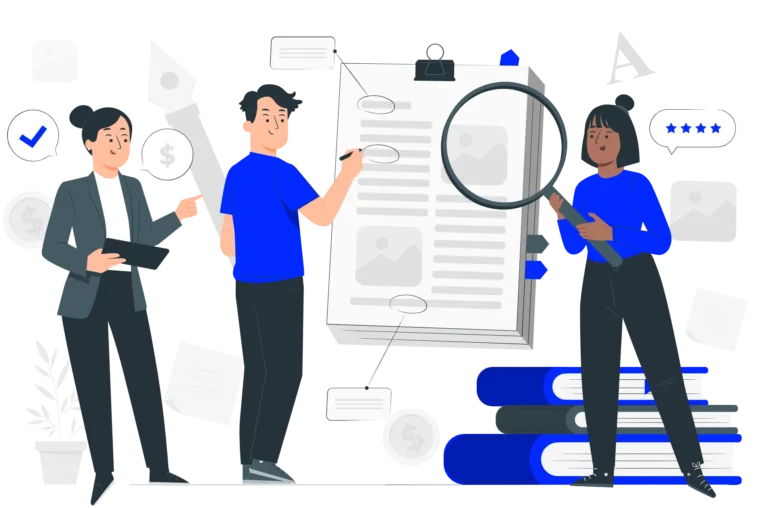In the world of contract management, efficiency, accuracy, and compliance are key. Managing contracts can be a difficult process, with numerous clauses, legal agreements, and regulatory standards to consider. To streamline the contract management process, many organizations are turning to a contract clause library.
In this guide, we’ll explore the benefits of contract clause libraries and the best ways to create and manage one. Whether you’re just starting, this guide offers helpful tips and answers.
What is a Clause Library?
A clause library is a single storehouse of specific clauses, template contracts, and relevant legal agreements. It provides contract managers with a valuable resource for contract building and contract clause management. By centralizing and uniting contract clauses, a clause library streamlines the contract management process.
Whether it’s a main clause, service provider clause, or privacy clause, a clause library stores sets of clauses. These help create precise contracts and follow the best methods.
A Clause Library is like a toolbox for contracts. It stores ready-made sections or clauses that makeup contracts. It’s like having a collection of building blocks for contracts. You can pick and choose the pieces you need from the library instead of starting from scratch every time.
Clause Library In CLM
In this digital age, CLM Software manages the Clause Library. It keeps track of different versions of clauses and ensures you always have the latest one available. When it’s time to draft a contract, you simply access the Clause Library and select the clauses you need. This saves a lot of time and effort.
The library contains both standard (master) clauses and alternative clauses. Standard clauses are used most often, while alternative clauses offer different options. They cover various aspects such as payment terms, confidentiality agreements, and indemnification clauses. Using a Clause Library streamlines the building process. Instead of spending hours drafting from scratch, you can create contracts in a fraction of the time. It’s like having a shortcut to creating legally binding agreements.
The Clause Library is not just beneficial for your legal department but also for your business partners. It ensures consistency and accuracy across. Plus, it reduces the risk of errors or discrepancies in your contracts. By using the Clause Library, you can protect your interests and streamline your drafting process effortlessly.
Related article: Top 10 CLM Software 2024
How a clause library can streamline the contract drafting process

Streamlining the contract drafting process is essential for contract managers. A clause library simplifies the process by offering valuable insights, consistency, and efficiency.
With a clause library, contract managers can easily find specific contract clauses and templates. This saves them time and energy when making them. By having a collection of pre-approved clauses managers can make sure that contract terms, and duties stay consistent.
Using a clause library also helps follow laws and rules. By combining clauses that deal with specific legal needs, contract managers can be sure their contracts meet legal standards. This not only lowers the chance of legal trouble but also shows the organization follows rules.
Moreover, a clause library makes managing agreements easier. Managing contracts means dealing with different stages, like making, discussing, and changing them. With a clause library, contract managers can move through these stages easily, finding the right clauses for each part. This makes sure contracts are correct, legally good, and match what the business wants.
Related article: Contract Automation: Embracing Legal Transformation
The Importance of a Contract Clause Library in Contract Management
A contract clause library is super important for managing contracts. It helps in many ways.
Firstly, it helps in making contracts accurately. You can quickly find approved clauses and standard contracts. Craft all contracts consistently and ensure they adhere to the rules.
Secondly, it helps in managing contracts throughout their life. Streamlining key clauses into a central location improves efficient tracking. This makes sure everyone does their part in the contract. It also makes it easier to see what’s going on, which reduces the chances of arguments or legal problems.
Lastly, it helps teams work better together. Both legal and procurement teams can use the library. Putting all the important parts of the contract upfront makes it clear to everyone what they need to do and what the deal is. It stops misunderstandings and makes the whole process smoother.
How a Clause Library Improves Efficiency and Reduces Risk
A contract clause library is like a toolbox that helps make handling contracts easier and safer. Here’s how it helps:
- Saves time: Instead of starting from scratch, contract managers can use ready-made parts and templates from the library. This makes their job faster and leaves time for other important tasks.
- Keeps things consistent and correct: The library makes sure all contracts use the same terms and language. By using approved parts, contract managers avoid mistakes and confusion, making contracts accurate.
- Lower legal risks: The library provides clauses that follow the law. This helps avoid breaking rules, arguments over contracts, and possible lawsuits.
- Makes contracts easier to follow: With the library, contract managers can easily find what they need. Keeping key contract points upfront simplifies tracking. Everyone knows what to do and when renewals are due, making things run smoothly.
How to Create and Maintain a Clause Library
Creating and managing a contract clause library takes careful planning and doing things right. Here are some important steps to make sure your library works well:
- Understand how your organization handles contracts: Learn how contracts are created and which clauses and agreements are commonly used.
- Find the most used parts and make templates: Identify frequently used contract sections and sample agreements. This will inform future contract crafting. These will be the main parts of your library.
- Keep track of changes: Stay informed and ensure everyone’s using the latest versions. This makes sure everything is correct and current.
- Organize the library: Arrange the library in a way that makes sense, like grouping similar clauses together. This makes it easier to find what you need.
- Keep things up-to-date: Regularly check and update the library with any new laws or rules. Make sure all clauses and templates are still relevant and correct.
- Train people to use the library: Teach contract managers and others how to use the library well. When everyone knows how to use it, it helps everyone involved in contracts.
Keeping the library up-to-date with current laws and industry standards
It’s really important to keep the contract library up-to-date with the latest laws and rules. This helps make sure contracts are correct and follow the right standards. By keeping an eye on any changes in the law, contract managers can avoid problems and make sure everything is legal. Here are some good ways to do that:
- Regular legal monitoring: Assign a team or individual responsible for monitoring legal developments specific to your industry. This may include changes in federal, state, or international laws, regulatory standards, and compliance requirements.
- Utilize external resources: Make use of outside sources like magazines. Legal advisors to stay up-to-date on important legal and industry changes.
- Document changes and updates: When legal developments occur, document the necessary changes and updates to the clause library. This ensures that contract managers have access to the most accurate and current clauses and template contracts.
- Communicate changes to stakeholders: Share the updated clauses with contract managers and other stakeholders. Proactively communicate the changes to ensure that everyone is aware of the latest legal requirements and obligations.
- Regular library reviews: Conduct periodic reviews of the contract clause library to assess its relevance and accuracy. Remove any outdated clauses or template contracts and replace them with the most up-to-date versions. This ensures that contract managers are working with the most accurate and compliant information.
Related article: How to digitize your physical contracts?
Diving into Contract Clauses
Contract clauses are the building blocks of contracts, defining the rights, obligations, and conditions of the parties involved. They address specific issues, scenarios, and legal requirements, ensuring the contract’s enforceability, legality, and clarity. Here is a comprehensive definition of contract clauses:
- Contract clauses are contractual provisions that set out, the responsibilities, and obligations of the parties involved in a contract.
- They address various aspects of the contract, such as data security, intellectual property rights, confidentiality, termination, breach, arbitration, and more.
- Contract clauses ensure the clarity and enforceability of the contract, protecting the interests of all parties involved.
- Each clause serves a specific purpose, addressing legal, regulatory, and business concerns within the contract.
- Contract clauses set out what each party expects and has to do. They establish a structure for managing and implementing the contract.
- Understanding different types of clauses helps contract managers manage contracts better. They can do this confidently, making sure contracts are correct, meet compliance rules, and protect business interests.
Common Types of Contract Clauses
Contracts come in many types, and each type needs special clauses to deal with its own legal, rules, and business issues. Here are some common types of contract clauses:
- Non-Disclosure Agreements (NDAs): Parts of contracts that keep trade secrets, or special knowledge safe between the parties involved.
- Service Provider Clauses: These clauses define the obligations, performance standards, and deliverables of service providers, ensuring the quality and timely delivery of services.
- Termination Clauses: In a contract explain when either party can end the contract. How much notice do they need to give, and what happens to both parties.
- Breach Clauses: These clauses explain what happens if someone breaks a contract, like paying for damages, or facing penalties. They also spell out what each party has to do if there’s a breach.
- Arbitration Clauses: Arbitration clauses determine how to solve problems, whether through discussion or litigation. They say how the process works, where it happens, and which laws apply.
These are just a few examples of the types of contract clauses commonly found in contracts. Knowing the various kinds of clauses helps contract managers deal with specific legal, business, and rule-related worries. This ensures that contracts are right, meet the rules, and manage the contract’s life well.
How Standardized Language Enhances Contract Clarity
Standardized language plays a vital role in contract clarity. Contract managers make contracts clear, prevent misunderstandings, and lower the chance of fights by using the same words consistently. Here’s how standardized language enhances contract clarity:
- Minimizes ambiguity: Standardized language leaves little room for interpretation, eliminating the potential for miscommunication or confusion between parties involved in the contract.
- Promotes consistency: Consistent terminology helps contract managers enforce contract obligations, ensuring that all parties adhere to clear, understandable terms.
- Enhances understanding: Standardized language facilitates comprehension of the contract, allowing stakeholders to fully grasp their rights, obligations, and legal obligations.
- Reduces the likelihood of litigation: Clear, standardized language reduces the risk of contract disputes and, ultimately, litigation. By establishing unambiguous terms, parties involved in the contract can operate with transparency and confidence.
Related article: Contract Templates Standardization
The Role of AI in Contract Analysis
Artificial Intelligence (AI) has revolutionized contract analysis, providing contract managers with valuable insights, efficiency, and accuracy. Here’s the role of AI in contract analysis:
- Automated contract review: AI-powered contract management software can automatically review contracts, extracting valuable data, clauses, and obligations. This saves contract managers time and effort in manual contract analysis.
- Risk identification and mitigation: AI algorithms help spot contract problems early so managers can fix them before trouble.
- Contract performance tracking: AI can monitor contract performance, providing insights into the effectiveness, compliance, and business impact of contracts. This data assists contract managers in making informed decisions and optimizing future contracts.
- Natural Language Processing: AI uses NLP for contract analysis, finding important parts, and getting insights from contract data. This promotes accuracy and consistency in contract analysis.
- Valuable insights: AI contract analysis helps managers understand clauses, duties, and rules in contracts. These insights enhance contract management, risk mitigation, and decision-making processes.
The Advantages of a Clause Library
A well-organized contract library has many benefits. It helps manage risks and makes legal work more efficient. With tools like AI and machine learning, it can give useful insights from past contracts. This helps find problems and mistakes faster.
Using technology like OCR, it can read and analyze lots of contracts quickly. This means less boring work for people and fewer mistakes. The system can also remind us when contracts are ending or need payments.
It has templates for common contract phrases, making it easier to create new contracts. This saves time and helps make sure contracts follow the rules. The AI can find contract issues and offer solutions to fix them.
By keeping all contract information in one place, it makes things clear and easy to understand. This helps everyone involved in the contract process, like different departments and outside partners, such as law firms. A well-maintained contract clause library offers numerous advantages for contract managers and organizations as a whole. Here are some key benefits:
- Consistency and accuracy: Keeping a good clause library makes sure contracts match rules by using consistent terms and language.
- Efficiency and time savings: A good library with templates and clauses saves time, and makes managing contracts easier.
- Risk mitigation: A clause library reduces risks by following rules, meeting legal needs, and avoiding contract fights.
- Transparency and visibility: A good contract library helps everyone see what’s going on and manage contracts better.
Conclusion
In conclusion, a contract clause library is a valuable tool for streamlining the contract drafting and management process. By centralizing all relevant clauses in one accessible location, you can save time, reduce errors, and improve efficiency. Keeping a good clause library updates contracts, lowering legal risks by following current laws and industry standards.
Additionally, utilizing technology or software can further enhance the management of your library. Regular monitoring of legal developments is crucial to ensure that your clause library remains comprehensive and relevant. Create a clause library to simplify contract management, improve clarity, and utilize standardized language with AI analysis. Invest in a comprehensive clause library to optimize your contract management and mitigate risks effectively.
About Volody Products Inc

Volody is a leading AI CLM Software company helping businesses to digitize and automate their legal contract management processes. Volody’s CLM uses AI & ML features to create smart and agile solutions. These solutions meet the needs of an ever-evolving business world. Trained with extensive data points, our smart CLM tool provides you with many insights. We help protect your company from any possible risks, be it financial, regulatory, or reputational.






